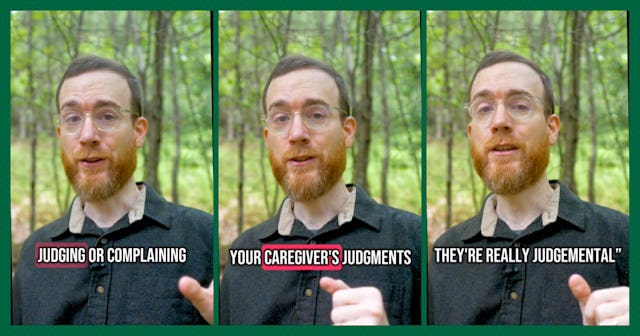What Your Kids Learn When You Judge Other People
“Even if your caregiver’s judgments weren’t directed at you, the behavior shapes how you see relationships.”

Once your kids hit a certain age — and it’s always earlier than you realize — you have to be very careful what you say around them. Because even when it seems they’re not paying attention, well, “little pitchers have big ears,” as they say. And while many use this phrase when they don’t want their words repeated by said big-eared pitchers, the more substantial damage might be to the child themselves. Nick Werber (@nick_werber), who talks a lot about family dynamics on his TikTok account, explains.
“When you grow up around a caregiver that was constantly judging or complaining about people behind their back but they did it in front of you, you may or may not have thought ‘Wow, mom or dad— they’re really judgmental.’ But what you might have absorbed is the fear that people are judging you behind your back,” he explains. “Because even if your caregiver’s judgments weren’t directed at you, the behavior shapes how you see relationships. It’s like you absorb that belonging means getting scrutinized. That closeness with other people opens you up to their judgments.
“I share this today not because I think parents should or even could be perfect in every way,” he concludes, “but because this is one of those things I think that really does affect sensitive, attuned kids and not enough people talk about this.”
It’s not something many of us have probably given much thought to, but hearing about this dynamic makes a lot of sense. So far, everyone I’ve shown this to has responded with some version of “Oh! Oh. Yeeeeeeah...”
Commenters on TikTok felt similarly seen and enlightened...
“My mother judged everyone,” said one. “The mailman, the cooking show host, the cashier at the grocery, the lady at the drive thru. This makes SO much sense.”
“Ergh yes,” groans another. “They were constantly pointing out ‘fat’ people.”
“Funny how growing up under constant judgment wires your brain to assume everyone’s holding a gavel, even when you’d never pick one up yourself,” muses a third. “It’s like your nervous system still thinks it's being graded, even though you dropped the class years ago.”
“Absolutely,” agrees another. “My mom, grandmother, and aunts live close together and talk about all the other family members. I will never open up or trust them because they will talk about my business too and make it everyone’s business.”
Look, no parent is perfect. And if we do something like this ourselves, it’s probably because it’s a behavior we observed somewhere in our own experiences, likely in our own family. Patterns are noticed, cycles repeat... but sometimes identifying these cycles can be an important step away from them.